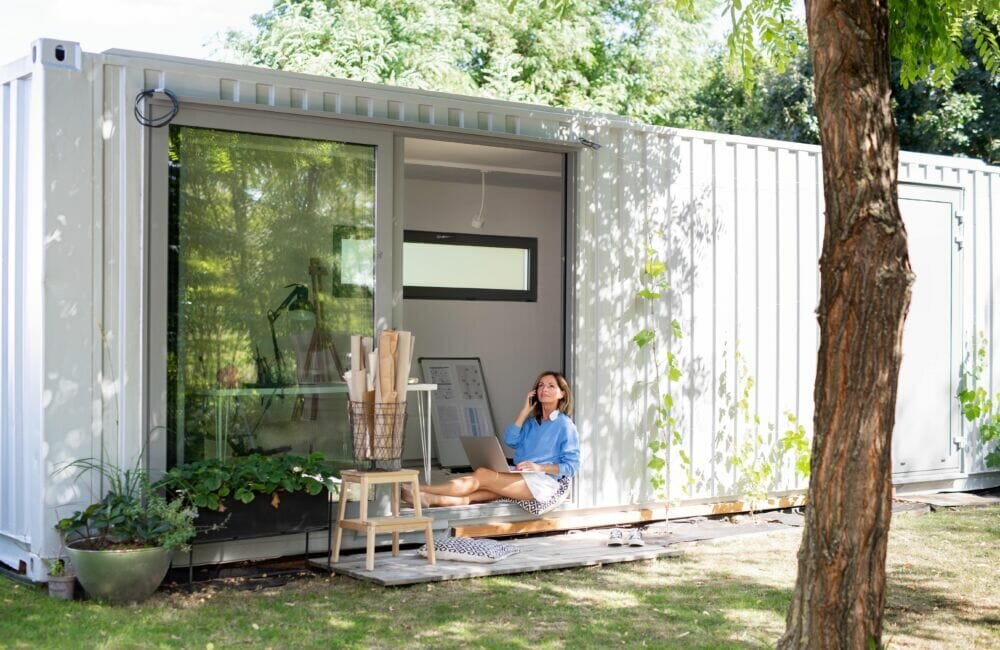In recent years, the definition of what constitutes a workspace has been shifting. As such, business owners are becoming more aware of the alternatives to traditional office space.
With the onset of the COVID-19 pandemic, many businesses have embraced the benefits of socially distanced working. According to a study by the Office of National Statistics, 69.6 per cent of employees in 2020 were completing duties at home. Working at home has been useful for some industries, however, others could not rely on this adjustment. For example, only 14.9 per cent of workers in sectors such as care and leisure worked from home.
Service, hospitality, and entertainment businesses have instead been searching for alternative workspaces that can accommodate their needs and save on cash. Storage containers have long been reliably used in the shipping industry, and now more industries are discovering their varied uses. This article will investigate the unique ways that storage containers are being used as workspaces across the country.
Somewhere to eat
Across the UK’s cities, there has been an emerging trend of storage container retail parks. These parks offer compact, affordable workspaces for business owners, often within the heart of the city centre, and all for a fraction of the price of permanent buildings.
Many of these container retail parks are focused not only on independent businesses but food and drink venues too. The concentration of storage containers as a venue is a unique, industrial sight in the cityscape, whether it is Manchester’s ‘The Hatch’ or Newcastle’s ‘STACK’. These containers are self-contained, and despite their industrial façade, act as communities that feel more like a rustic marketplace than a hectic city-centre location.
Using storage containers as the accommodation for these units saves on hefty long-term construction bills. In turn, these savings allow for smaller businesses to take advantage of lower rent costs, whereas they might be priced out of other workspaces.
Somewhere to stay
After a lengthy lockdown, holiday-goers are keen to do just that: go on holiday. Unfortunately, Michael O’Leary, chief executive of Ryanair, has predicted that the price of holidays is going to be “dramatically higher” next year.
In response, Brits are increasingly opting for a staycation rather than travelling abroad, with enquiries for 2022 staycations up by 74 per cent. It’s clear that holidaymakers are very conscious of finding a good deal on their holidays. Converted storage containers offer a cheap, stylish option for lodgings.
British holiday accommodation businesses can take advantage of this increased interest in staycations by expanding their capacity. However, constructing new accommodation can be a costly affair.
‘Glamping’ (glam camping) has been on the rise, and storage containers offer an affordable alternative for businesses looking to expand. Not only that, but a storage container stay in the British countryside can be a unique holiday destination for vacationers.
Somewhere to work
Storage container office space can give a great first impression to customers and onlookers. If you want your workplace to give off sleek, modern energy, then storage containers are a great choice.
Aside from being a cost-effective alternative, storage container workspaces have other advantages. First of all, storage containers are easily adaptable to the needs of your business. You can modify your container to reflect the style of your business and set it out from others.
Similarly, storage containers are entirely modular. If your workforce grows, you can adapt your space to accommodate your employees. As long as you have ground space to cover, storage containers can continue to be added.
Alternatively, your business might only require a workspace during busier periods, such as Christmas or summer. In these cases, temporary accommodation might be beneficial. A storage container can be hired if you’re looking for accommodation without a long-term commitment.
Somewhere to entertain
While many businesses require a consistent hub of activity all year round, this is not true of all companies. A business may thrive in certain seasons or regularly work from home, but a physical presence can still be beneficial.
For independent companies, a permanent office space may not be financially feasible. Pop-up events and temporary workspaces are an affordable way for brands to avoid costly year-long lease obligations and maintain a street presence. Storage containers can be hired temporarily as an affordable workspace alternative.
Pop-up events can be a bit of a risk for small and independent businesses, but the affordability of storage containers as venues can minimise this risk. In particular, entertainment brands and businesses could capitalise on the use of storage containers.
A storage container could act as a stage for a gig, performance, or festival. It could house a short-term art installation for local artists to showcase their work.
As businesses continue to seek alternative solutions to workspaces, we’re bound to see more ideas for how companies can adapt their spaces. Given their affordable prices, style, and compact spacing, it’s no surprise that temporary workspaces have been chosen by independent businesses as a fashionable and useful choice.



